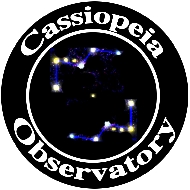iPhone Venus, Jupiter, & Moon
Posted: 26 June 2018
|
Open: Monday, 25 June 2018, 1856 MST Temperature: 85°F |
Session: 1259 Conditions: Clear, breezy |
Equipment Used:
12" f/8 LX600 w/StarLock
2" 24mm UWA eyepiece
2" 9mm 100° eyepiece
2" 30mm eyepiece
Camera:
iPhone 8 Plus
This was a planned short session due to an early morning commitment the next day.
1902 MST: LX600 ON, StarLock OFF, High Precision OFF.
Viewed Venus, 102X and 271X.
Took this handheld iPhone 8 Plus afocal 271X photo of Venus using the iOS app NightCap Camera (ISO 20, 1/900sec, 2X lens):

The gibbous phase of Venus shows clearly in the handheld photo.
1911 MST: viewed Jupiter, 102X. Two moons were visible against the still bright blue sky. The Great Red Spot was visible rotating out of view.
1916 MST: viewed Jupiter, 271X. Still only two moons visible.
1919 MST: picked up a Jovian moon shadow crossing the disk of Jupiter, 271X. The shadow was of the moon Ganymede. Ganymede and Io were the two moons currently visible.
This iPhone handheld afocal 271X photo with NightCap Camera (ISO 20, 1/200sec, 2X lens) shows the Great Red Spot, the moon Ganymede, and Ganymede's shadow:

Mouseover or tap on image for labels
1929 MST: the Jovian moon Europa was now visible, 271X. 1930 MST: the moon Callisto was now visible, 271X. The Ganymede shadow transit was nearly over.
1938 MST: sunset. Calm now.
Ganymede shadow was not leaving the disk. The Great Red Spot was barely visible at Jupiter's limb.
1941 MST: viewed the waxing gibbous Moon, 102X.
Took this handheld iPhone afocal 81X photo of the Moon using NightCap Camera (ISO 22, 1/3200sec):

1949 MST: final look at the Moon, 102X.
1950 MST: LX600 OFF.
|
Close: Monday, 25 June 2018, 1959 MST Temperature: 82°F |
Session Length: 1h 03m Conditions: Clear |
Comments are welcome using Email. Twitter users can use the button below to tweet this report to their followers. Thanks.
Cassiopeia Observatory Home Page
Copyright ©2018 Michael L. Weasner / mweasner@me.com
URL = http://www.weasner.com/co/Reports/2018/06/26/index.html
